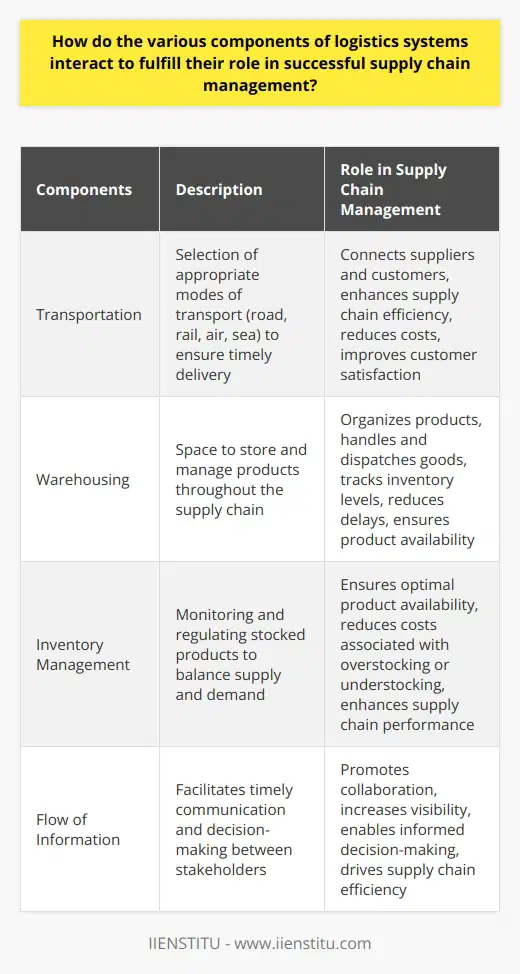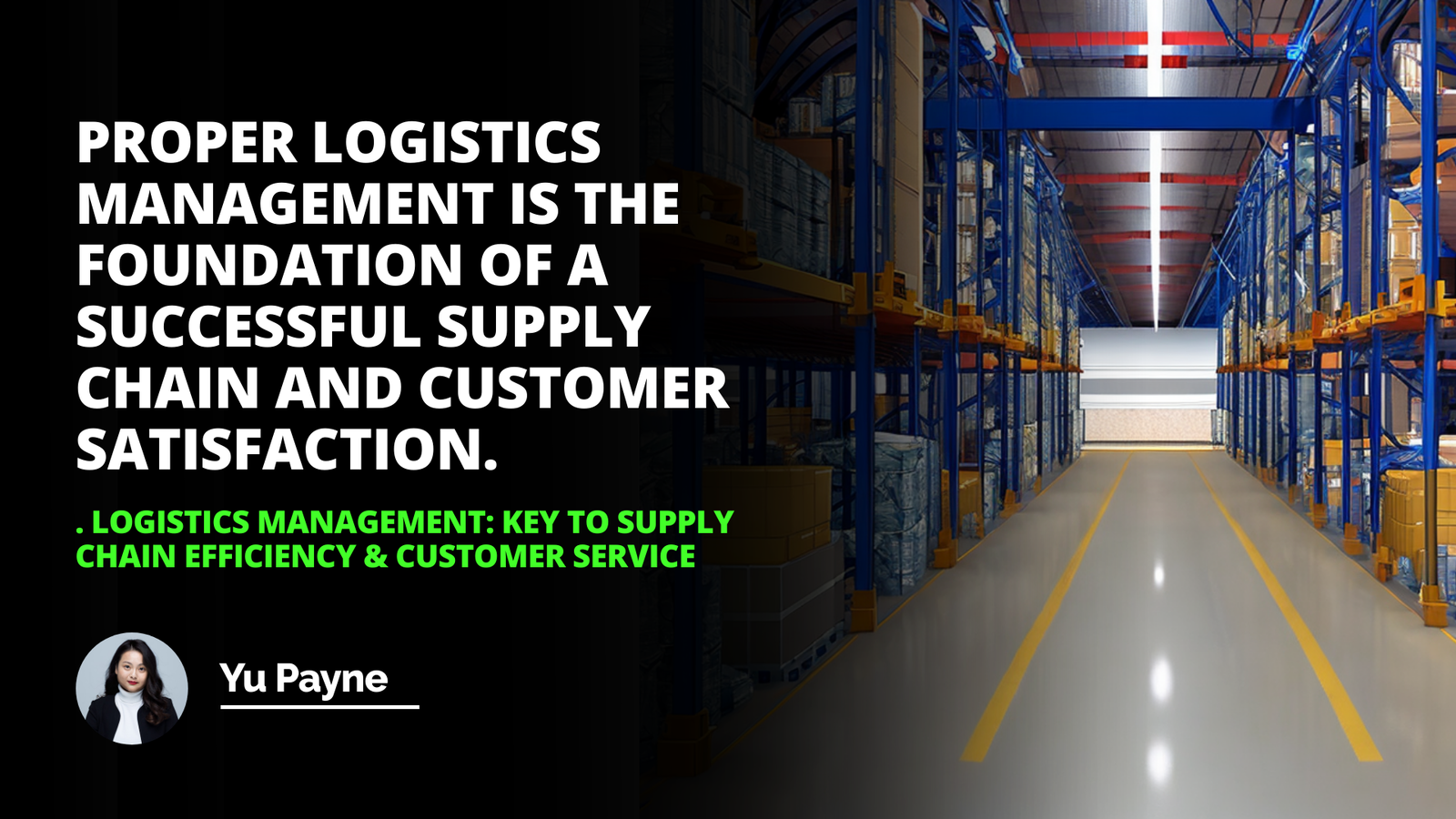
The Heartbeat of Commerce: The Impact of Logistics on Business Performance
Let's take a little journey, shall we? Imagine you're five years old again, standing on a busy sidewalk, holding your mom's hand tightly as trucks and buses whiz past you. Each one of those trucks is filled with goods—maybe your favorite cereal or that shiny new bicycle you’ve been eyeing. What you might not realize at such a tender age is that all those goods moving around aren't merely coincidence or magic. It's logistics in action, the behind-the-scenes hero that ensures things arrive just where they need to be, right on time.
Logistics: The Backbone of Modern Business
Logistics isn't just a fancy word you toss around in board meetings to sound smart. It's actually a pivotal management function that many companies owe their success to. At its core, logistics involves planning, implementing, and overseeing the transportation and storage of goods from their starting points at production to their final destinations with consumers (Coyle, John J., et al., "Supply Chain Management: A Logistics Perspective," Cengage Learning, 2017). It sounds straightforward, but trust me, it's anything but simple.
Future Challenges İn Supply Chain Management İnterview Question
Enhancing Customer Service İn Supply Chains Best Practices 2023
İnterview Question Efficient Supply Chain Key Components Explanation
Here's a fun fact: the term "logistics" was originally tied to the military. Yes, logistics was practically a soldier, ensuring that troops got their essential supplies even in the remotest fields. Fast forward to today, it's an essential cog in the wheel of commerce, ensuring companies can efficiently deliver products, thanks to a streamlined supply chain.
Logistics in Supply Chains: Why It Matters
One might wonder, what specific role does logistics play in supply chain operations? Well, if you look at a supply chain as a living entity, logistics is akin to the circulatory system. Just as blood delivers vital nutrients and oxygen throughout your body, logistics ensures that goods are transported swiftly and smoothly — ensuring efficiency, reducing costs, and bringing flexibility.
Speed and Efficiency: Think about how fast you want that newly purchased gadget from your favorite online store. Companies prioritize logistics to ensure rapid delivery, fulfilling customer expectations.
Cost Savings: Efficient logistics translates to reduced costs—not just by optimizing transport but also by minimizing inventory storage needs.
Flexibility: Ever notice how certain products are only "in" during certain seasons? Logistics facilities adapt to market changes, ensuring the supply chain remains robust.
Logistics are the backbone of the supply chain, ensuring a seamless flow of goods and services.
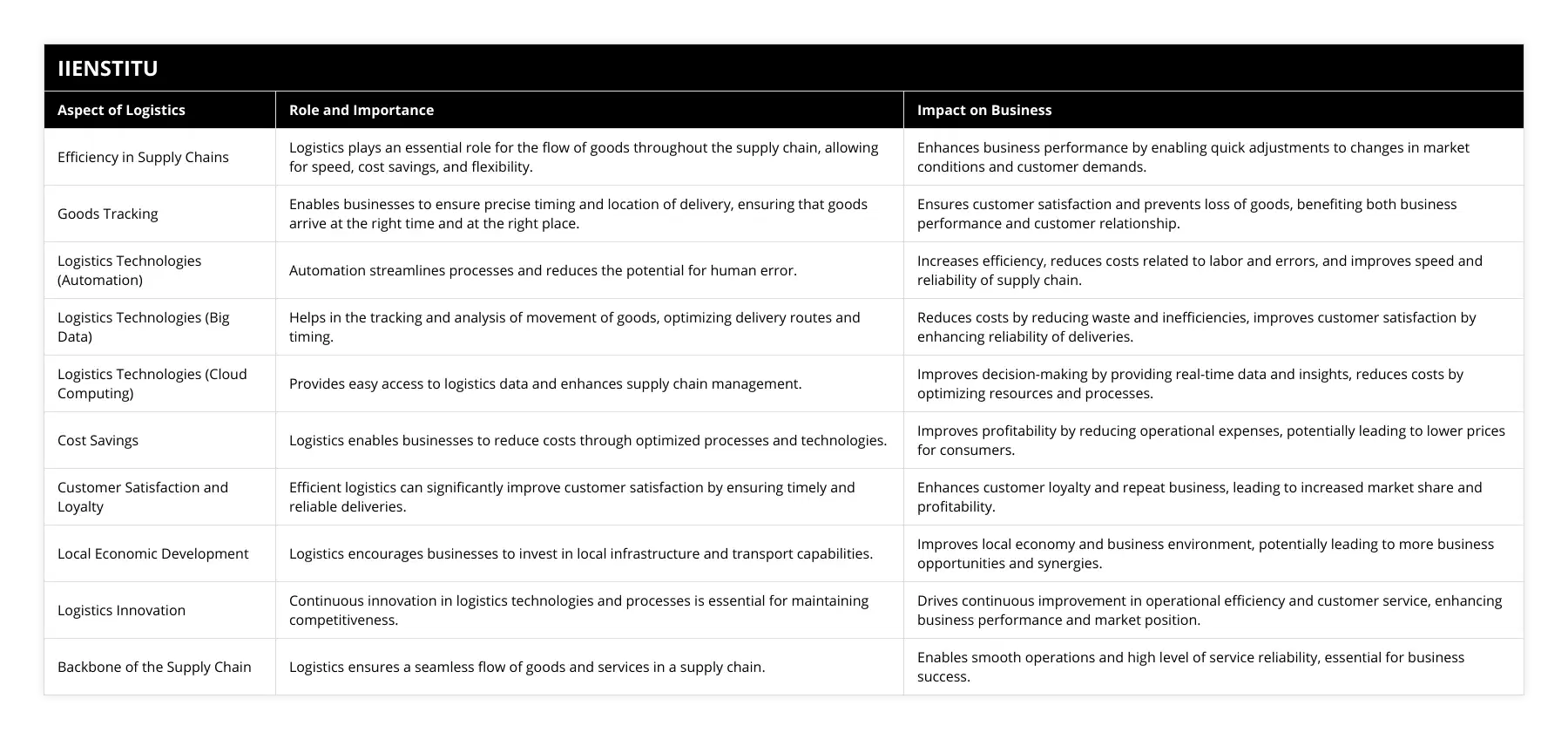
Moreover, logistics acts as a tracking system, like radar systems in airports. With it, businesses track the movement of goods, ensuring timely arrivals every single time. My friend, Sarah, runs a petite but passionate artisanal bakery. Her trusting of proficient logistics means her rare Peruvian cocoa arrives precisely when she needs it, preventing disappointing her clientele.
Embracing New Technologies in Logistics
Remember blockbuster technology shifts that changed the game? Think the advent of smartphones or cloud storage. In the logistics realm, we've witnessed similar revolutions thanks to automation, big data, and cloud computing.
Automation: No exaggeration, automation is nothing short of magic. It minimizes errors, optimizes routes, and can even anticipate potential disruptions. Robots in warehouses, anyone?
Big Data: Every transaction, every movement, all the numbers crunched together provide insights that were previously unimaginable. For instance, imagine spotting a trend that indicates an upcoming surge in a particular product's demand before it even happens!
Cloud Computing: This tech marvel allows for effortless access to data, even when you're miles away from the actual operations. It fosters a connected, efficient, and responsive supply chain.
In an illuminating passage from "The Digitalization of the 21st Century Supply Chain" by Stuart M. Rosenberg (2018), there’s a deep dive into how invaluable technology can become when it’s synergistically applied with logistics. Businesses today rely heavily on data and digital solutions, akin to how fish need water.
The Tangible Impacts of Logistics on Business
When businesses get logistics right, it's akin to the wind steering a sailboat gently and swiftly across the waters. Here are some notable impacts:
1- Cost Efficiency: With logistics optimized, businesses can slash costs holistically—from inventory management to transportation.
2- Improved Customer Satisfaction: In today's world, customers want things yesterday. Effective logistics ensures timely deliveries, nurturing customer trust and loyalty.
3- Encourages Economic Development: On a macro level, by investing in top-notch logistics, businesses cultivate local infrastructure and transportation systems, indirectly uplifting the community and economy.
A heartwarming scenario is that of Mr. Lee, a diligent farmer in the Midwest. Thanks to enhanced logistics, his fresh produce finds its way to major urban centers, ensuring city dwellers enjoy farm-fresh delights while ensuring fair compensation for all his hard work. That’s logistics nurturing an ecosystem—economically and socially.
A Personal Anecdote: Logistics Saving the Day
Allow me a personal detour here. A couple of years back, I planned a small event. Nothing elaborate, just a gathering of close friends for my son's birthday. Everything was perfect—decorations, music, and ambiance. But the pièce de résistance, a multi-layered chocolate cake from a renowned local bakery, was nowhere to be seen an hour before the event. Panic ensued. Calls were made left, right, and center.
And then, like a scene from a hero movie, a delivery van pulled up at my driveway. With a grin, the delivery personnel handed me the cake. Thanks to their meticulous logistics planning, what could have been a disaster turned into a cherished memory. The logistics team at the bakery had routed deliveries efficiently, ensuring the cake arrived just in time.
Conclusion: The Unsung Hero
In the expansive universe of business operations, logistics might seem like a galaxy far from the glamorous neon-lighted epicenters of decisions. But it's logistics that often dictates the trajectory of many businesses, acting as the silent puppeteer orchestrating a complex dance (Christopher, Martin, "Logistics & Supply Chain Management," FT Publishing International, 2016).
As we evolve and as technology advances, logistics will not just remain a supporting star but will continually reshape its role, directing businesses towards efficient, sustainable, and revolutionary paths. Whether you're a small business owner or leading a multinational corporation, always keep an open dialogue with your logistics strategy. After all, as we’ve seen, it can save not just costs, but can turn potential mishaps into memorable tales.
So, next time you see a delivery van or watch a freight ship sail into the horizon, take a brief moment to nod in appreciation towards logistics. It's more than just the movement of goods. It's the very heartbeat of commerce, ensuring our worlds are interconnected, thriving, and ever-moving.
References
1- Coyle, John J., et al. Supply Chain Management: A Logistics Perspective. Cengage Learning, 2017.
2- Rosenberg, Stuart M. The Digitalization of the 21st Century Supply Chain. Business Expert Press, 2018.
3- Christopher, Martin. Logistics & Supply Chain Management. FT Publishing International, 2016.
Frequently Asked Questions
What strategies can businesses use to reduce their supply chain logistics costs?
The cost of goods and services for businesses can be significantly reduced by implementing sound supply chain management practices. To ensure efficient and cost-effective operations, companies should evaluate their supply chain logistics and identify areas that could benefit from cost savings. The following strategies can be employed to reduce supply chain logistics costs:
Consolidating shipments: Consolidating purchases and shipments among suppliers can reduce overall costs by improving delivery efficiency and eliminating excessive packing and handling fees.
Outsourcing: Outsourcing certain logistical operations can save businesses money regarding staff wages and benefits, reduce overhead costs, and improve operational efficiency.
Automation: Automating specific processes, such as order fulfillment, inventory management, and transportation coordination, can significantly reduce operational costs. Automation substantially cuts down the labor costs and time associated with manual tasks.
Negotiating Logistics Contracts: By negotiating acceptable service levels with carriers in advance and agreeing on fixed-price contracts, businesses can reduce the volatility of their logistics costs.
Implementing Total Quality Management: Total quality management helps identify potential cost savings in the procurement process. Total quality management ensures all stakeholders know their responsibilities and work together to optimize service and costs.
In addition to the above strategies, businesses should consider technology investments such as Enterprise Resource Planning (ERP) and Logistics Visibility Software. By utilizing these tools, companies can gain visibility into their supply chain and have the ability to monitor shipments, track inventory, and optimize transportation routing.
Overall, the abovementioned strategies can help businesses reduce their supply chain logistics costs significantly, enhancing their profitability. Successful implementation of these strategies requires a concerted effort from stakeholders across the supply chain and a well-thought-out approach to cost control.
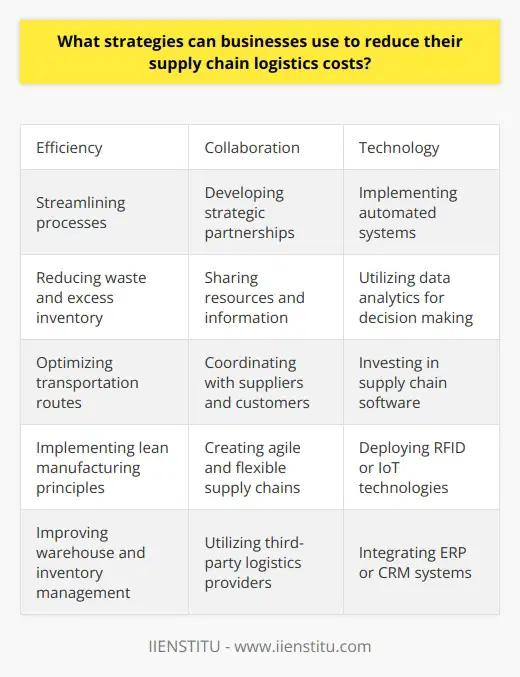
How does current technology improve the performance of logistics systems?
In recent years, the importance of technology in logistics systems has increased significantly, with new advances in hardware, software, and communication systems. Tracking and managing goods efficiently and reliably is essential to ensure smooth operations and maintain customer satisfaction. Technology can help to improve the performance of logistics systems in several ways.
One key area where technology is vital is optimizing route planning and scheduling. Automated systems can draw on large volumes of data to assess traffic flows, analyze cost and time factors, and calculate the most efficient route from one point to another. In addition, vehicle tracking systems such as GPS and radiofrequency identification (RFID) tags can ensure that goods are delivered on time, monitor goods in transit, and reduce the risk of theft or misplacement.
Furthermore, sophisticated warehouse management systems can dramatically reduce the time required for goods to be handled, enabling a smoother and more efficient operation. Automated systems can track and inventory products, simplify store management processes, and even facilitate goods sorting and automatic packing.
Combining technology, automation, and data management can improve supply chain visibility and efficiency. Monitoring multiple inventory points across the supply chain can minimize issues such as stock-outs. Collecting and analyzing data in real-time can help quickly anticipate and address potential problems.
The introduction of cloud computing has also simplified the integration of information between different supply chain members, resulting in better communication, reduced delays, and increased efficiency.
Technology can benefit logistics systems, including improved route planning and scheduling, better warehouse management, superior supply chain visibility and coordination, and more intelligent data management and analysis. Continued investment in technology can therefore be a key enabler of improved performance for logistics systems.
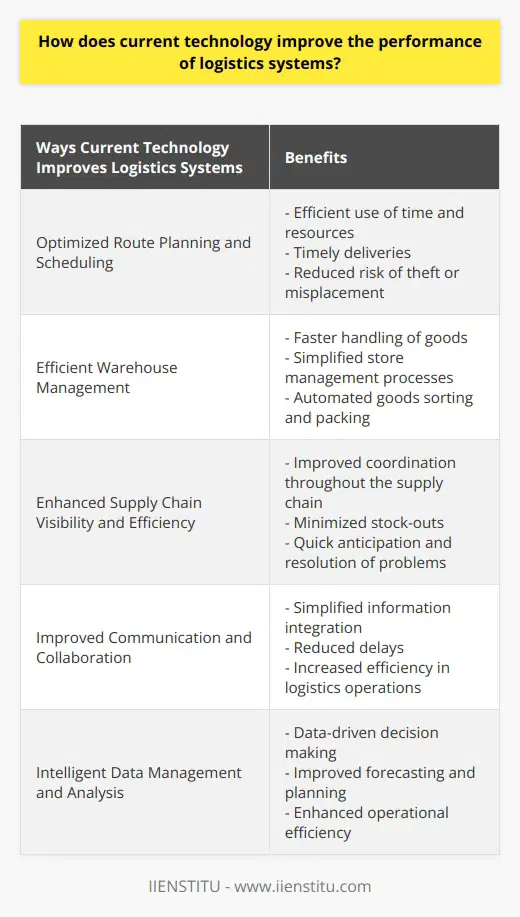
What are the most important factors for effective logistics management?
Logistics management is one of the essential components of any business that is involved in transporting goods and services. Consequently, it is necessary to have effective logistics management practices in place to ensure that goods and services are transported promptly and cost-effectively. Several key factors are beneficial for effective logistics management.
Firstly, it is essential to have accurate forecasting to plan for future transportation needs accurately. Combining methods such as trend analysis, decision trees, and other statistical tools can help accurately predict what is required, when, and how to optimize the logistics processes. The forecasting process also helps to identify areas where there may be an increased capacity for transport and points where it would be beneficial to decrease the number of products transported. Foreseeing potential problems is an invaluable skill in logistics management as it helps to anticipate and adjust the logistics processes to ensure they run smoothly.
Another critical factor for effective logistics management is the incorporation of technology. Technologies such as AI, IoT, and GPS tracking exceptionally maximize efficiency, improve accuracy, and track goods in real-time. These technologies allow for automated processes that can reduce errors and improve time and cost efficiency while providing real-time insights into the status of goods and supplies.
Finally, communication between all involved parties is essential for effective logistics management. Communication should include information on the availability of goods and services, order tracking, delivery times, and any delays that can arise. This helps to ensure Smooth operation and provides transparency to each party involved in the process.
In conclusion, effective logistics management is essential for businesses involved in transporting goods and services. Good forecasting techniques, technology integration, and effective communication are all key factors that contribute to effective logistics management. By incorporating these factors into the logistics processes, businesses can maximize efficiency and thus reduce costs.
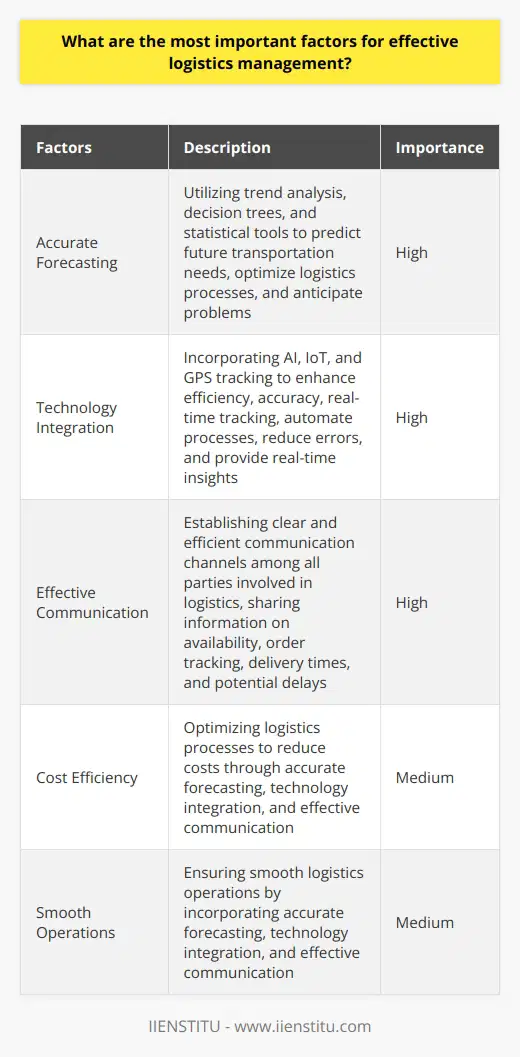
What is the key role of logistics in ensuring efficient and effective supply chain operations?
Key Role of Logistics
The key role of logistics in ensuring efficient and effective supply chain operations lies in its ability to manage the movement and storage of goods and services. This crucial function encompasses various activities that must be precisely coordinated to achieve overall business objectives.
Coordination of Activities
Logistics coordinates the transportation, warehousing, and inventory management aspects of a supply chain, playing a vital part in optimizing costs and time. When properly managed, logistics facilitates the smooth flow of products from the point of origin to the point of consumption, ensuring that consumer demands are met in a timely manner.
Optimizing Costs
Efficient logistics management leads to a reduction in overall operating costs through strategic decisions focusing on transportation modes, route planning, and inventory levels. These decisions enable companies to minimize warehousing expenses, transportation costs, and labor expenses, leading to increased profitability and competitiveness.
Managing Inventory
One of the critical aspects of logistics is inventory management, which aims to maintain an optimal stock level to meet consumer demand. This process involves accurate forecasting, identifying the right quantity and location of stock, and controlling the flow of goods along the supply chain. As a result, logistics ensures that products are available to meet customers' needs while minimizing the risk of stockouts or overstock situations.
Maintaining Visibility
Logistics also plays a crucial role in maintaining supply chain visibility, allowing businesses to track and monitor products throughout the entire process. By using advanced technologies such as GPS, RFID, and IoT, companies can gain real-time information about the status, location, and condition of their products in transit, enabling them to make informed decisions and quickly respond to any disruptions or delays.
Enhancing Responsiveness
Finally, an essential function of logistics in supply chain operations is enhancing the responsiveness to fluctuations in demand and supply. This flexibility allows companies to adapt to changes in the market, ensuring that supply meets demand even during sudden surges, seasonal peaks, or unforeseen challenges.
In conclusion, logistics plays a critical role in achieving efficient and effective supply chain operations. By coordinating activities, optimizing costs, managing inventory, maintaining visibility, and enhancing responsiveness, logistics provides the necessary support for businesses to thrive in an increasingly competitive global market.
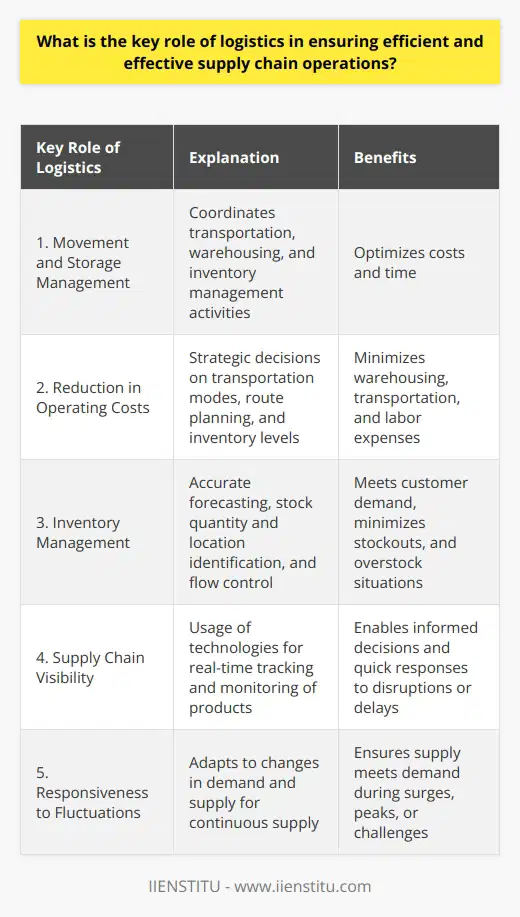
What are the main functions of logistics within the scope of supply chain management, and how do they contribute to overall efficiency?
Functions of Logistics in Supply Chain Management
The primary functions of logistics within supply chain management encompass transportation, warehousing, and inventory management. These functions play a critical role in ensuring the efficient movement and storage of goods from the point of origin to the point of consumption, enabling businesses to operate smoothly and meet customer demands.
Transportation: Streamlining Movement
Transportation is an integral component of logistics, responsible for moving products from suppliers to manufacturers, and ultimately to the customers. An effective transportation system enables on-time deliveries, reduces costs, and helps maintain a competitive edge.
Warehousing: Optimizing Storage
Warehousing manages the storage of goods throughout the supply chain, ensuring the timely availability of products to meet customer demands. Efficient warehousing operations minimize storage costs while preventing product losses and damages, contributing to higher profitability.
Inventory Management: Balancing Supply and Demand
Inventory management involves maintaining an optimal balance between supply and demand to ensure that the right products are available at the right time, place, and quantity. This functionality helps reduce lead times, minimize stockouts, and lower holding costs, supporting overall business efficiency.
Integrating Functions for Efficiency
Logistics functions within the supply chain are interconnected, and their efficiency is often contingent on effective integration. Effective supply chain management must create synergies among transportation, warehousing, and inventory management to reduce redundancies and costs, enhance responsiveness to market fluctuations, and ultimately improve the efficiency of the entire supply chain.
In conclusion, the main functions of logistics in supply chain management - transportation, warehousing, and inventory management - contribute significantly to overall efficiency by streamlining movement, optimizing storage, and balancing supply and demand. The integration of these functions plays a crucial role in maximizing the performance of supply chains and driving business success.
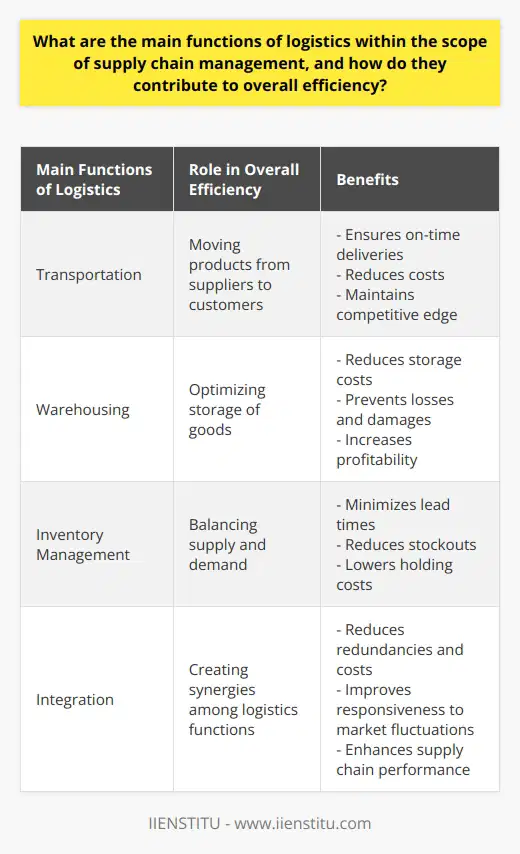
How do the various components of logistics systems interact to fulfill their role in successful supply chain management?
Components Interplay in Logistics Systems
Effective supply chain management significantly relies on the efficient coordination and interaction among the various components of logistics systems. Essentially, these components consist of transportation, warehousing, inventory management, and information flow. When these elements function harmoniously, they create a well-oiled logistics machine that ensures successful supply chain management.
Transportation: Connecting Suppliers and Customers
The transportation component facilitates the movement of goods from suppliers to customers, serving as the backbone of logistics systems. It involves the selection of suitable modes of transport, such as road, rail, air, or sea, ensuring that products reach their destinations on time. By maintaining reliable transportation networks, companies can enhance overall supply chain efficiency, minimize cost, and improve customer satisfaction.
Warehousing: Storing and Managing Products
Warehousing plays a crucial role in logistics systems by providing a space to store and manage products throughout the supply chain. It involves the proper organization of products, handling, and dispatching of goods, and tracking inventory levels. A well-managed warehouse contributes to an organized and efficient supply chain by reducing delays and ensuring that products are readily available to meet customer demands.
Inventory Management: Balancing Supply and Demand
Inventory management involves the monitoring and regulation of stocked products to ensure that demand is met without incurring additional costs associated with overstocking or understocking. Effective inventory management strategies, such as just-in-time and vendor-managed inventory, enable organizations to maintain an optimal balance between product availability and inventory costs, thus enhancing overall supply chain performance.
Information Flow: Streamlining Communication and Decision-Making
Seamless information flow is integral to successful logistics systems, as it ensures timely communication and decision-making between various stakeholders, such as suppliers, manufacturers, distributors, and customers. Advanced information technologies, like Enterprise Resource Planning (ERP) systems, support the exchange of critical data, including order information, inventory levels, and shipment tracking. This real-time information promotes better collaboration, increased visibility, and enables organizations to make informed decisions that drive supply chain efficiency.
In conclusion, the various components of logistics systems interact harmoniously to fulfil their essential role in successful supply chain management. By focusing on the efficient interplay of transportation, warehousing, inventory management, and information flow, businesses can optimize their logistics operations and achieve a competitive advantage in the market.
